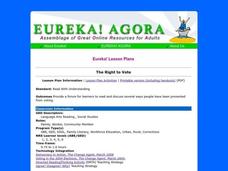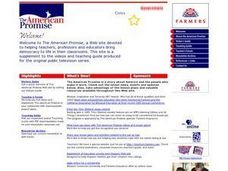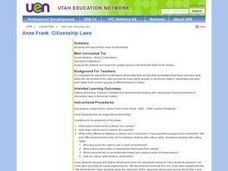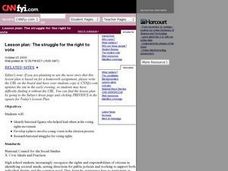Curated OER
Voting Adventure
Students discover the requirements they need to be able to vote in a democracy. Using that information, they discuss the importance of voting in an election. They use the Internet to analyze voter participation numbers in their county....
Curated OER
The Right to Vote
Students are provided a form for learner to read and discuss several ways people have been prevented from voting. Students relate what they know and discovered about voting rights for different population of people. They establish a...
Curated OER
Elections and Voting
Students discuss political parties by participating in an election and voting process in the classroom. They engage in the citizen responsibilities for electing a government official. Students discuss the history of voting in the...
Curated OER
Ensuring Democracy in Iraq
Students explore what democracy means and how it can be spread to Iraq. They create strategies to ensure elections are fair. Students discuss the importance of fair voting conditions and the features of a democracy.
Curated OER
Get the Facts on the Candidates
Students work in teams to research candidates from a current political race. They access primary and secondary resources and differentiate between fact and opinion. Students present their findings to the class in an oral report and...
Curated OER
A Map Can Tell a Story
Students use colored pencils to label maps of Alabama. They discuss where and if the state constitution should be put into effect. They identify voting patterns in the area and a relationship between areas of Alabama and political...
Curated OER
It's Election Time!
Pupils explore the voting process. They discuss presidential elections, identify the characteristics for what makes the best costume, and participate in a class vote for best class costume.
Curated OER
A Closer Look at Voting Patterns
Students examine the importance of voting. They analyze voter turnout graphs, conduct research, list the benefits and costs of voting, and write a paper that describes ways to increase voter participation.
Curated OER
Anne Frank: Citizenship Laws
Pupils study early civilizations and the contributions they made to the foundations of human culture. They discuss why citizenship is valuable and the Constitutional Amendments that are associated with it.
Curated OER
Proportional Representation: A Fairer Voting System?
Tenth graders work as a grade to conduct a mock election. They tally votes in two different systems and discuss if proportional representation or straight counting of votes leads to a fairer outcome.
Curated OER
Priorities and Power: Migrants and Voting
Pupils examine the African-American migrants entry into the political process. They summarize their findings in a short essay.
Curated OER
CIVIL DISOBEDIENCE
Students use events of the time to illustrate the significance of the 1965 Selma-to-Montgomery Voting Rights March.
Curated OER
Electing a President
Learners brainstorm and list qualities that they would look for in a president; students rank qualities in order of importance.
Curated OER
Electronic Elections
Students evaluate the role of voting in democratic societies and the potential of voting on the Internet.
Curated OER
Community Voting Habits
Students prepare a survey about voting habits in the community. Students give the survey to parents, teachers, business owners, and other voting age members of their community, and analyze the data.
Curated OER
Voting and the U.S. Constitution (Past, Present, and Future)
Students discuss the 26th Amendment, then write letters to a future guest speaker. Students listen to the guest speaker and ask them questions about voting and voter turnout. Students then create handbills urging citizens to vote.
Curated OER
Fighting Political Apathy Among Youth
Young scholars research and describe youth participation in political elections. They survey random adults about their voting behavior and chart the results in a graph. They compile their results to predict future voter participation.
Curated OER
The Struggle For The Right To Vote
High schoolers identify historical figures who helped lead others in the voting rights movement, and research historical struggles for voting rights. They develop plans to involve young voters in the election process.



















